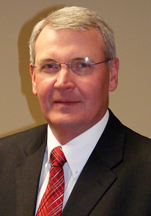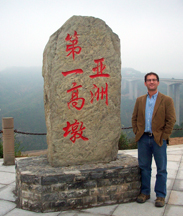Mayor of Kansas town devastated by tornado to speak with Purdue science policy class, research faculty
March 26, 2014
 |
|
Greensburg, Kan., was 95 percent destroyed by an F5 tornado late on the evening of May 4, 2007, killing 11 people. In the aftermath, the community has deployed a sustainable rebuilding effort, making Greensburg a model for environmentally efficient living. |
WEST LAFAYETTE, Ind. - The mayor of a Kansas community devastated by an F5 tornado in 2007 will meet on Tuesday (April 1) with Purdue University faculty members and students who are studying the role of science in policy decisions related to hurricanes, earthquakes and tornadoes.
Greensburg Mayor Robert Dixson, a member of the White House Task Force on Climate Preparedness and Resilience, was invited to Purdue by professors Timothy Filley of the Department of Earth, Atmospheric and Planetary Sciences, and Megan Sapp Nelson of Purdue Libraries, who team teach this semester's Great Issues class, Science & Society: Natural Disasters.
Dixson will speak to the Great Issues class and give presentations to groups in Discovery Park's Global Sustainability Institute on disasters, community resilience and his roles as a national advocate for sustainable redevelopment of disaster-impacted communities and an appointee to President Obama's climate preparedness and resilience task force.
 |
|
Robert Dixson |
"Mayor Dixson can provide our students and, in fact, our communities surrounding Purdue with an incredible perspective on how a science-driven vision can steer policy at the local level in resurrecting a community literally decimated by a natural disaster," said Filley, who also is director of the U.S.-China Ecopartnership for Environmental Sustainability in Discovery Park.
"The Greensburg case and Mayor Dixson's visit highlight how Purdue students – our leaders of tomorrow – can apply real-world situations and critical thinking across disciplines to understand the complex interactions of science and policy."
The city of 1,600 people in southwestern Kansas was 95 percent destroyed by the F5 tornado late on the evening of May 4, 2007, killing 13 people and injuring more than 60 others.
Greensburg leaders decided that the city would not just rebuild but would become a model green community. The city adopted a resolution stating that all municipal facilities be constructed at the highest sustainable level.
The city whose claim to fame came from being home to the largest hand-dug well is now the world's leading community in LEED-certified buildings per capita.
 |
|
Tim Filley |
With its slogan "Rebuilding … Stronger, Better, Greener," the city of Greensburg is home to a half-dozen LEED-platinum certified buildings, including the new City Hall and the new 48,500-square-foot Kiowa County Memorial Hospital. Wind turbines and solar panels are scattered all over town, providing renewable energy to power the entire community. Streetlights are all LED.
A native Kansan who has lived in Greensburg since 1985, Dixson was elected mayor in May 2008. When the tornado hit Greensburg seven years ago, he was the city's postmaster. His goal in coming to Purdue, talking to students and others and serving on the White House's Task Force for Climate Preparedness and Resilience: To show how a natural disaster can force citizens to examine who they are and what they truly value a community.
"With what we have been through in Greensburg the past seven years, we learned that the only true green and sustainable things in life are how we treat each other," Dixson said.
"In total, 13 people died and 95 percent of our town was destroyed. But we also discovered that the town itself was a casualty, too. We realized our heritage and ancestors were based on those sustainable, green principles. If you take care of the land, it will take care of you."
Discovery Park's Global Sustainability Institute was launched to coordinate research efforts in sustainability challenges such as climate change, energy, food security, the environment and water. It includes the Purdue Water Community Energy Center, Center for the Environment, Purdue Climate Change Research Center, Purdue Center for Global Food Security and the U.S.-China Ecopartnership for Environmental Sustainability.
Writer: Phillip Fiorini, 765-496-3133, pfiorini@purdue.edu
Sources: Tim Filley, 765-494-6581, filley@purdue.edu
Robert Dixson, 620-723-2751, mayor@greensburgks.org
Note to Journalists: Reporters wanting more detailed information about Greensburg (Kan.) Mayor Robert Dixson's visit for coverage plans can contact Phillip Fiorini, Purdue External Relations, pfiorini@purdue.edu at 765-427-3009.

